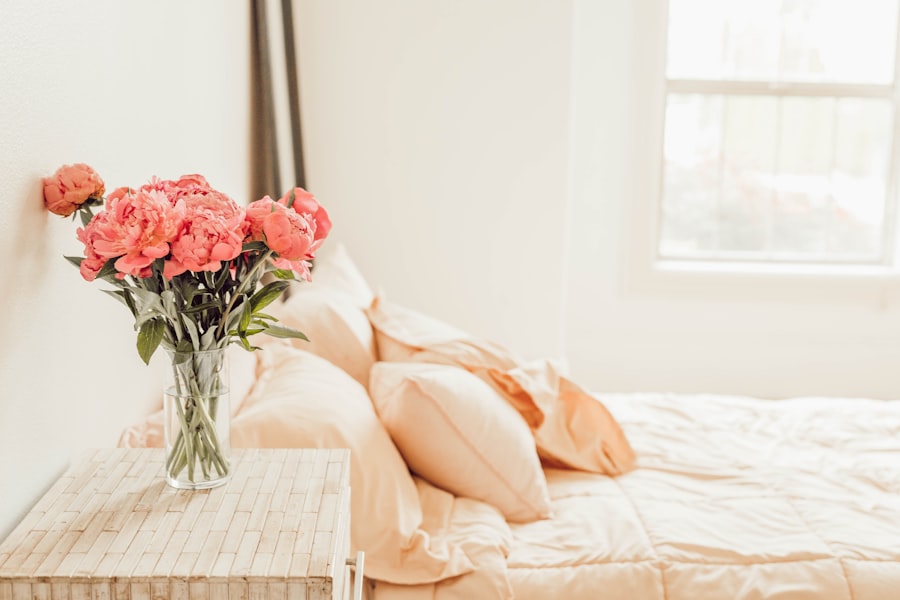Sleep hygiene practices refer to the habits and routines that promote good sleep quality and quantity. These practices are essential for maintaining optimal physical and mental health. In today’s fast-paced world, many individuals neglect the importance of sleep and fail to prioritize it in their daily lives. However, understanding and implementing good sleep hygiene practices can have a profound impact on overall well-being.
Key Takeaways
- Good sleep hygiene practices are essential for maintaining overall health and well-being.
- Quality sleep is important for physical and mental health, including memory consolidation and immune system function.
- Understanding sleep cycles can help individuals optimize their sleep patterns and improve sleep quality.
- Factors such as stress, caffeine, and technology use can negatively impact sleep quality.
- Creating a sleep-conducive environment, including a comfortable bed and dark, quiet room, can improve sleep quality.
Importance of Sleep Quality
Poor sleep quality can have detrimental effects on both physical and mental health. When we don’t get enough restful sleep, our bodies are unable to repair and rejuvenate themselves properly. This can lead to a weakened immune system, increased risk of chronic diseases such as obesity and diabetes, and impaired cognitive function.
On the other hand, good sleep quality has numerous benefits. It improves memory and concentration, enhances mood and emotional well-being, boosts creativity and problem-solving skills, and increases productivity. Additionally, quality sleep is crucial for muscle recovery, hormone regulation, and overall physical performance.
Understanding Sleep Cycles
Sleep is a complex process that consists of different stages. These stages can be divided into two main categories: non-rapid eye movement (NREM) sleep and rapid eye movement (REM) sleep.
NREM sleep is further divided into three stages: N1, N2, and N3. N1 is the transition stage between wakefulness and sleep, characterized by light sleep and easily disrupted by external stimuli. N2 is a deeper stage of sleep where brain activity slows down, body temperature drops, and heart rate decreases. N3 is the deepest stage of sleep, also known as slow-wave sleep (SWS), where the body repairs itself, growth hormone is released, and memories are consolidated.
REM sleep is the stage where dreaming occurs. During this stage, brain activity increases, heart rate and blood pressure rise, and breathing becomes irregular. REM sleep is essential for cognitive function, memory consolidation, and emotional regulation.
Factors Affecting Sleep Quality
Several factors can affect sleep quality, both external and internal. External factors include noise, light, and temperature. Noise disturbances can disrupt sleep and prevent individuals from entering deep sleep stages. Similarly, exposure to bright lights, especially blue light emitted by electronic devices, can interfere with the body’s natural sleep-wake cycle.
Internal factors such as stress and anxiety can also impact sleep quality. When individuals are stressed or anxious, their minds are racing, making it difficult to fall asleep or stay asleep throughout the night. Additionally, the use of technology before bed can stimulate the brain and make it harder to relax and fall asleep.
Tips for Creating a Sleep-Conducive Environment
Creating a sleep-conducive environment is crucial for promoting good sleep quality. One important factor to consider is the temperature of the room. The ideal temperature for sleeping is between 60-67 degrees Fahrenheit (15-19 degrees Celsius). This range helps to cool down the body and promotes better sleep.
Another essential aspect is having a comfortable mattress and pillows. Investing in a high-quality mattress that supports your body’s natural alignment can significantly improve sleep quality. Additionally, choosing pillows that provide adequate support for your neck and head can prevent discomfort and pain during the night.
Lastly, using blackout curtains and white noise machines can create a peaceful and quiet environment that promotes better sleep. Blackout curtains block out external light sources, while white noise machines mask any disruptive sounds, creating a soothing atmosphere for sleep.
The Role of Technology in Sleep Quality

Technology has become an integral part of our lives, but it can also have a negative impact on sleep quality. The blue light emitted by electronic devices such as smartphones, tablets, and computers can suppress the production of melatonin, a hormone that regulates sleep-wake cycles. This can make it harder to fall asleep and disrupt the natural sleep pattern.
However, technology can also be used to improve sleep quality. Sleep tracking apps and devices can provide valuable insights into sleep patterns and help individuals identify areas for improvement. These tools can track sleep duration, quality, and even provide recommendations for better sleep hygiene practices.
Importance of Consistency in Sleep Patterns
Consistency in sleep patterns is crucial for maintaining good sleep quality. Going to bed and waking up at the same time every day helps regulate the body’s internal clock, known as the circadian rhythm. This consistency allows the body to anticipate sleep and wake times, making it easier to fall asleep and wake up feeling refreshed.
On the other hand, irregular sleep patterns can disrupt the circadian rhythm and lead to poor sleep quality. Shift work, jet lag, and inconsistent bedtimes can all contribute to irregular sleep patterns. It is important to prioritize a consistent sleep schedule to ensure optimal sleep quality.
The Impact of Diet on Sleep Quality
Diet plays a significant role in sleep quality. Certain foods and beverages can interfere with sleep, while others can promote better sleep. Caffeine, found in coffee, tea, and some sodas, is a stimulant that can keep individuals awake and disrupt sleep patterns. It is best to avoid consuming caffeine in the afternoon and evening.
Alcohol is another substance that can negatively impact sleep quality. While it may initially make individuals feel drowsy, alcohol disrupts the natural sleep cycle and prevents deep, restorative sleep. It is best to limit alcohol consumption or avoid it altogether for better sleep quality.
A balanced diet that includes foods rich in tryptophan, magnesium, and vitamins B6 and C can promote better sleep. Tryptophan is an amino acid that helps produce serotonin, a neurotransmitter that regulates mood and promotes relaxation. Magnesium helps relax muscles and promote calmness, while vitamins B6 and C are involved in the production of sleep-regulating hormones.
Exercise and Sleep Quality
Regular exercise has numerous benefits for overall health, including improved sleep quality. Engaging in physical activity during the day can help regulate the sleep-wake cycle and promote better sleep at night. Exercise increases the production of endorphins, which are natural mood boosters that can reduce stress and anxiety, leading to better sleep.
The timing of exercise can also impact sleep quality. Exercising too close to bedtime can increase alertness and make it harder to fall asleep. It is best to finish exercising at least a few hours before bed to allow the body to cool down and relax.
The Benefits of Incorporating Relaxation Techniques in Your Sleep Hygiene Routine
Incorporating relaxation techniques into your sleep hygiene routine can have a significant impact on sleep quality. Meditation and deep breathing exercises can help calm the mind and relax the body, making it easier to fall asleep and stay asleep throughout the night. These techniques promote a state of relaxation and reduce stress and anxiety, leading to better sleep quality.
Reducing stress is crucial for improving sleep quality. Chronic stress can disrupt the natural sleep-wake cycle and lead to insomnia or poor sleep quality. By incorporating relaxation techniques into your daily routine, you can reduce stress levels and promote better sleep.
In conclusion, good sleep hygiene practices are essential for maintaining optimal physical and mental health. Poor sleep quality can have detrimental effects on overall well-being, while good sleep quality has numerous benefits. Understanding the different stages of sleep, creating a sleep-conducive environment, prioritizing consistency in sleep patterns, maintaining a balanced diet, engaging in regular exercise, and incorporating relaxation techniques are all important aspects of good sleep hygiene practices. By implementing these practices, individuals can improve their sleep quality and enjoy the many benefits that come with it.
If you’re looking to improve your sleep quality, you may also be interested in exploring techniques to enhance your intelligence and memory. In a related article on Intelligence Snacks & Hacks, you can discover effective strategies to supercharge your cognitive abilities. From brain-boosting exercises to memory-enhancing techniques, this article provides valuable insights on how to optimize your mental performance. Check out the article here for practical tips and tricks to enhance your brainpower.
FAQs
What is sleep hygiene?
Sleep hygiene refers to a set of practices and habits that promote good quality sleep and help individuals maintain a healthy sleep-wake cycle.
Why is sleep hygiene important?
Sleep hygiene is important because it can help individuals improve the quality and duration of their sleep, which can have a positive impact on their physical and mental health.
What are some common sleep hygiene practices?
Common sleep hygiene practices include establishing a regular sleep schedule, creating a relaxing sleep environment, avoiding caffeine and alcohol before bedtime, and limiting screen time before bed.
How can a regular sleep schedule improve sleep quality?
A regular sleep schedule can help regulate the body’s internal clock, making it easier to fall asleep and wake up at the same time each day. This can improve sleep quality and help individuals feel more rested and alert during the day.
What is a relaxing sleep environment?
A relaxing sleep environment is one that is cool, dark, and quiet. This can help promote relaxation and reduce distractions that may interfere with sleep.
Why should caffeine and alcohol be avoided before bedtime?
Caffeine and alcohol can interfere with sleep quality and make it more difficult to fall asleep and stay asleep. It is recommended to avoid these substances for several hours before bedtime.
How does limiting screen time before bed improve sleep quality?
The blue light emitted by electronic devices can interfere with the body’s production of melatonin, a hormone that helps regulate sleep. Limiting screen time before bed can help promote relaxation and improve sleep quality.





